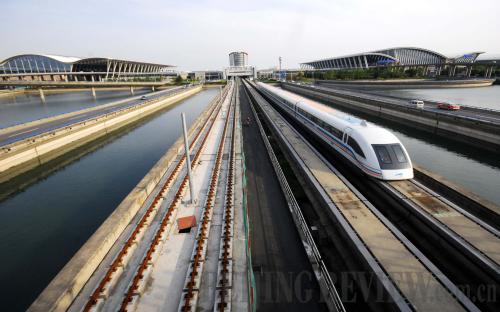|
 |
|
GREEN TRANSPORTATION: A maglev train runs by the Shanghai Pudong International Airport (XINHUA) |
Commercialization
William F. Miller (professor emeritus at Stanford University and Co-Director of the Stanford Program on Regions of Innovation and Entrepreneurship of the United States)
For advanced technologies to benefit cities, three basic ingredients are needed. One is significant science and research output that creates innovation and contributes to high productivity.
The second is entrepreneurs who turn these innovations into business opportunities. Universities are obviously key sources of creative talents who can push forward innovations in technologies as well as management.
But the most important thing is that researchers' innovations should be market-oriented, and also the businessmen must know how to use the innovations. Major multinationals, such as Microsoft, Yahoo! and Google, have a large number of professionals devoted to connections between research and the industries. They are increasingly important nowadays as they can relate the technology to the business application and at the same time understand the market.
Other features necessary for a successful entrepreneurial atmosphere include favorable government policies, a flexible and mobile workforce, an open business environment that rewards risk-taking and tolerates failure, venture capital and global links. Innovations are being made across the globe. They just need to be brought together to create promising products.
China's solution
Wan Gang (Chinese Minister of Science and Technology)
Science and technology have always been significant components of urban development and social progress. Before the 1880s, only 3 percent of the world population lived in cities. But what helped reshape the global economic landscape and spur the exodus of people from country to city were technologies. The three industrial revolutions, characterized by the steam engine, electric power and computers, respectively, fueled modern industries, sowing the seeds of urban prosperity. Today, cities are home to more than half the global population and account for at least 70 percent of the world's GDP.
Of course, cities are not exactly utopias. Surging fossil fuel consumption contributed to a global wealth boom, but also triggered unintended consequences like pollution, energy shortages and climate change.
While cities across the globe are now gearing up for economic growth, there's an urgent need for energy conservation and environmental protection, as well as public security and health issues. These challenges can only be addressed with technological innovations. And for China, there's a lot that needs to be done to steer its cities along a sustainable path of development.
First, it is necessary to press ahead with cutting-edge technologies like new, energy-efficient materials and waste recycling. Efforts are also needed to monitor climate change more efficiently and protect the ecological environment. In addition, information technology and intelligence networks will be key to improving city management including transport control and disaster relief.
Second, China has and will continue to support the renewable energy sector and emerging industries. For instance, the government has already handed out generous incentives to promote electric vehicles and initiated a national program to accelerate integration between the three networks: telecom, radio and television, and the Internet.
| 